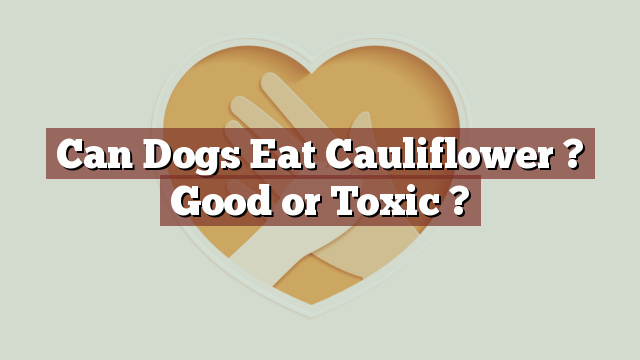Can Dogs Eat Cauliflower? Good or Toxic?
It is important for pet owners to know which foods are safe to feed their furry companions. While certain human foods can be harmful to dogs, others can actually provide nutritional benefits. One food that often sparks curiosity is cauliflower. Can dogs eat cauliflower? Is it good or toxic for them? Let’s delve into the topic and uncover the truth.
Nutritional Value of Cauliflower: Rich in vitamins and minerals
Cauliflower is a cruciferous vegetable that is known for its numerous health benefits in humans. This versatile vegetable is low in calories and carbohydrates, making it an excellent choice for those watching their weight. Additionally, cauliflower is packed with essential vitamins and minerals. It is a rich source of vitamin C, vitamin K, and several B vitamins. It also contains minerals such as potassium, magnesium, and calcium. Furthermore, cauliflower is high in fiber, which aids in digestion and promotes a healthy gut.
Can Dogs Eat Cauliflower? Unveiling its Safety for Canine Consumption
Can dogs eat cauliflower? The answer is yes, dogs can safely consume cauliflower. In fact, cauliflower is considered to be non-toxic to dogs. However, it is important to note that while cauliflower is safe for dogs, it should be given in moderation and prepared properly. Raw cauliflower can be difficult for dogs to digest and may cause gastrointestinal discomfort. Therefore, it is highly recommended to cook or steam cauliflower before serving it to your furry friend.
Potential Risks or Benefits of Cauliflower for Dogs
When given in moderation and prepared correctly, cauliflower can offer several health benefits to dogs. The high fiber content of cauliflower can aid in maintaining a healthy digestive system and prevent constipation. Furthermore, the vitamins and minerals present in cauliflower can contribute to overall canine health. For example, vitamin C can boost the immune system, while vitamin K is essential for proper blood clotting. Additionally, the antioxidants found in cauliflower can help reduce the risk of chronic diseases in dogs, just as they do in humans.
However, it is important to be aware of potential risks associated with cauliflower consumption. As mentioned earlier, raw cauliflower can cause digestive issues in dogs, including gas and bloating. Moreover, some dogs may have difficulty digesting cauliflower due to its high fiber content. It is crucial to monitor your dog’s reaction and adjust the portion size accordingly. If your dog shows any signs of discomfort or allergic reactions after consuming cauliflower, it is best to consult a veterinarian for guidance.
What to Do if Your Dog Eats Cauliflower: Step-by-Step Guide
If your dog happens to consume cauliflower, there are a few steps you can take to ensure their well-being. Firstly, assess the situation and determine if your dog ate a small or large amount of cauliflower. If it was just a small nibble, chances are your dog will be fine. However, if your dog consumed a significant amount or shows any signs of discomfort, it is crucial to monitor them closely.
Next, determine if the cauliflower was cooked or raw. If it was cooked, the risk of digestive issues is significantly lower. However, if your dog consumed raw cauliflower, keep an eye out for any signs of digestive upset such as vomiting or diarrhea. If these symptoms persist or worsen, it is advisable to seek veterinary advice.
In any case, it is always best to consult with a veterinarian if you have any concerns about your dog’s health or diet. They can provide professional guidance tailored specifically to your dog’s needs.
Conclusion: Cauliflower in Moderation Can Be Beneficial for Dogs
In conclusion, cauliflower can be a healthy addition to a dog’s diet when given in moderation and prepared properly. It is a nutritious vegetable that offers various vitamins and minerals, as well as fiber and antioxidants. However, it is important to ensure that cauliflower is cooked or steamed before serving it to your dog to avoid any potential digestive issues. As with any new food, it is crucial to monitor your dog’s reaction and consult a veterinarian if you have any concerns.
Remember, a balanced diet is key to maintaining your dog’s overall health and well-being. By being mindful of what you feed your furry friend, you can contribute to their long and happy life.
Thank you for investing your time in exploring [page_title] on Can-Eat.org. Our goal is to provide readers like you with thorough and reliable information about various dietary topics. Each article, including [page_title], stems from diligent research and a passion for understanding the nuances of our food choices. We believe that knowledge is a vital step towards making informed and healthy decisions. However, while "[page_title]" sheds light on its specific topic, it's crucial to remember that everyone's body reacts differently to foods and dietary changes. What might be beneficial for one person could have different effects on another. Before you consider integrating suggestions or insights from "[page_title]" into your diet, it's always wise to consult with a nutritionist or healthcare professional. Their specialized knowledge ensures that you're making choices best suited to your individual health needs. As you navigate [page_title], be mindful of potential allergies, intolerances, or unique dietary requirements you may have. No singular article can capture the vast diversity of human health, and individualized guidance is invaluable. The content provided in [page_title] serves as a general guide. It is not, by any means, a substitute for personalized medical or nutritional advice. Your health should always be the top priority, and professional guidance is the best path forward. In your journey towards a balanced and nutritious lifestyle, we hope that [page_title] serves as a helpful stepping stone. Remember, informed decisions lead to healthier outcomes. Thank you for trusting Can-Eat.org. Continue exploring, learning, and prioritizing your health. Cheers to a well-informed and healthier future!

